“The acquisition of knowledge is one of the things I value the most, which is why the most rewarding aspect of my experience has been learning from people’s archives as well as my own”
I was first introduced to the Community-Driven Archives (CDA) Initiative when they contacted MECHA to inquire whether we wanted or needed tools and support to preserve our materials. MECHA is a multinational political organization and has been an active student organization at Arizona State University since 1968, yet, their work has been consistently ignored or shut down by institutions, especially within archival records.
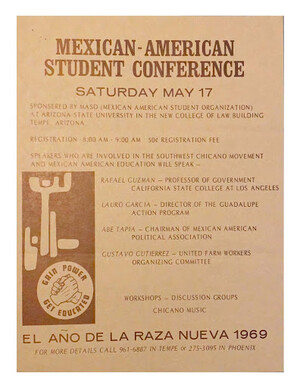
Flyer for Mexican-American Student Conference 1969 at ASU
To add to that, most of the records are kept /by alumni and not shared. Since most of this source material is not being shared or preserved the voices of the students within the organization are not being heard making it extremely difficult to represent the work and the problems the student organization face on campus. As many BIPOC student organizations continue to be active on campus, they are continuously creating archival evidence and memories that run the risk of erasure.
![ME[CHA] National Conference 2021 with different chapters in the nation](/sites/default/files/styles/width_300/public/images/Mechaoutdoor_0.png?itok=_BV0wygL)
ME[CHA] National Conference 2021 with different chapters in the nation
As part of an organization that has a lot of documents and photos of actions, events, and meetings I am glad that CDA reached out to MECHA because that is where I learned the importance of preservation and what it looks like to do the work. I remember being told that a lot of our photos and scrapbooks had mold in them, I wasn’t aware of what mold looked like or how harmful it can be to be exposed to it. When MECHA members finally got down to appraising materials I was able to find community members in the photos, photos of the old mecha room, and protest events.
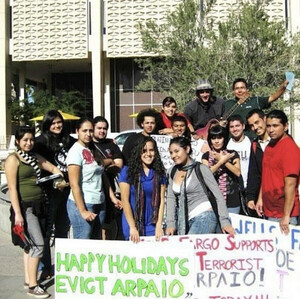
Circa 2008-2011
When I started the process I started thinking about how I needed to do this with my archives either through storytelling or looking through my family photos. Thankfully CDA gave me an archive box and Mylar where I put together my photos from my childhood. After that, I was able to organize my family photos by events and dates, which made it easier to identify my age and the names of family members. My collection of photos has been a reminder of these warm and special moments I have had in my life.
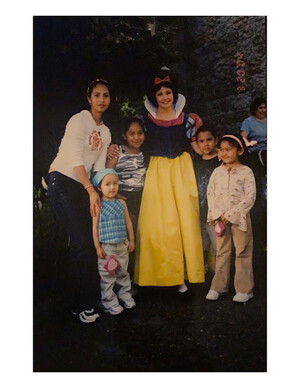
Group photo with Snow White at DisneyLand 200
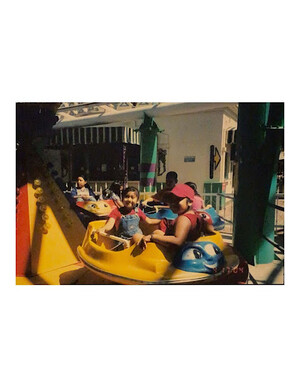
Denise and Ivette on Castle n’ Coasters ride
The best experience with preservation efforts and CDA is that I can see the impact through our work, the outcome. When we connect with community members, they come back to show us what they have found throughout the process. I love seeing working-class BIPOC communities break barriers by participating in projects that institutions have gate kept from us. My journey with archives has given me the strength to speak the truth and the power to help re-write white settler-colonial narratives that have historically twisted the stories of BIPOC communities to fit a hegemonic agenda. This is especially true within AZ archives that glorify the Wild West from a cowboy gunslinging perspective and the growth of white settlement on indigenous land such as McCulloch Brothers Inc. Photographs. I am glad I have been able to continue working with CDA for almost 3 years now because it has given me the chance to see collections grow, become digitally accessible, and I have witnessed new people being introduced to archives.
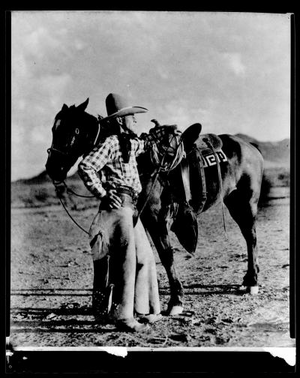
Now every time I look into something new I get an archive glow feeling, which describes a sense of overwhelming shock or surprise when I am looking and hearing something completely new to me that strikes my curiosity and reignites my passion to continue this work.The acquisition of knowledge is one of the things I value the most, which is why the most rewarding aspect of my experience has been learning from people’s archives as well as my own.
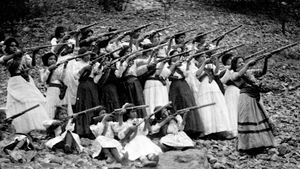
For those who want to start or continue their archival preservation journey, CDA provides resources and tools to underrepresented groups in order to boost archival representation and empower these groups. Our archive starter kits include preservation information and archival supplies (acid-free boxes, folders, mylar, and gloves). Click here for more information and to request an Archive Starter Kit.